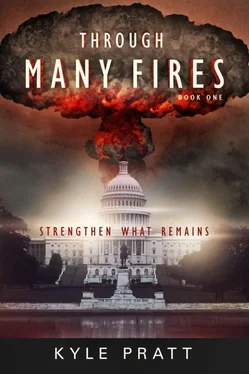He opened the door to his car. Now, onto the armory.
He drove east, about a mile out of town, and then turned onto a side road that led north up a large hill. The area was well wooded on the right with the left side looking down into the valley and over the town. Nice homes had been built along this part of the hill and as a young man Caden had been up here many times, but never onto the armory. As he rounded a curve near the crest a light snow fell. A few hundred yards farther and a large, gray, two-story building surrounded by a chain-link fence came into view.
As he slowed to stop at the gate a soldier stepped from the guardhouse. The guard, in ACUs, the now standard camo uniform, carried an M-4 over his shoulder. A dozen or more children played on the large grassy lawn that surrounded the main building. Despite the growing snow several adults in civilian clothing mingled among the children.
The sentry saluted and asked for identification.
Caden flashed his ID. “Who is the commanding officer and where are they?”
“Lieutenant Brooks. His office is on the second floor. I don’t know the room number.”
“That’s fine. I’ll find it.” They exchanged salutes and Caden pulled into a nearby parking lot. He glanced back at the guard who was on the phone. He knew he would not have to find Brooks, the lieutenant would come to find out why a major had arrived. Using his cane, he walked as casual as possible, for a man with a limp, toward the building.
Several kids ran over to him.
“My dad is in the Army.”
“What’s wrong with your leg?”
“Do you have a gun?”
“When can we go home?”
Just like the kids at the refugee camps. No. He glanced at the growing number of children around him. These kids are more…bouncy and none have asked me for food. Well, as yet anyway.
Only as he approached did he notice the keypad beside the main door. Do the kids know the entry code? Before he could ask, a young second lieutenant exited, popped to attention, and saluted.
“I’m Lieutenant Brooks. How can I help you sir?”
Caden returned the salute and looked him up and down. Other than the rank insignia at the center of his chest, and the unit badge, there was little else in the way of ribbons or insignia. However, he wore a pistol on his hip.
The lieutenant stood about as tall as Caden and had close-cut blond hair. I’m young, but this guy is a kid, probably fresh out of some college ROTC program. “I’m Major Westmore, here to assume command. Let’s go to the office.”
Brooks seemed tense as he turned to open the door.
On the upper floor a small office served as headquarters for Bravo Company, the unit stationed at the armory. To his left several motivational prints hung on the wall, while the right featured recruiting posters, a picture of Governor Monroe and Adjutant General Harwich, the head of the Washington Guard, along with random thumb tacks that no one had bothered to remove. In the corner a radio played the numbing drumbeat of emergency announcements. Beside it was a SINCGARS army transceiver that was on and a shortwave radio that was turned off. Caden stopped and talked briefly with the four soldiers in the room.
The next space was a mid-sized conference room. One wall was covered in a large map of southwest Washington and on another were smaller maps of Hansen, the county and the state. A large table and chairs filled the center. In many ways both rooms were much like any of the hundreds of other military offices Caden had been in, old and in need of fresh paint, but it would serve as a decent command center.
Two open doors led to offices, but Brooks stopped, “Perhaps this would be a good place to begin the transition.”
Caden handed him the written orders.
Brooks read them, came to attention and said. “What are your orders, sir?”
“I’ll need a detailed report on the company’s personnel and equipment status. When that is ready we can bring in the other senior personnel, but for right now I’d like a briefing from you.
“Senior personnel, well,” he sighed, “that’s a good place to start. Other than First Sergeant Fletcher there are no senior personnel. We’re shorthanded, about half-strength at fifty-two soldiers.”
Well, that’s the brief on personnel. Not so good. “Why do we have children and civilians here?”
“I know it is against regulations, but many of the soldiers were worried about their families. I was the only officer here; I don’t know where the commander is….”
“He’s dead.”
“Oh.” His eyes went wide and he took a slow deep breath. “Do you know when or how, sir?”
Caden told him what he knew.
“About the civilians… well, most of our soldiers live outside Hansen, some as far away as Seattle. I authorized them to move their families here if they feared for their safety. Most chose to do so.”
“Good call.”
“Really?”
Caden smiled. “Really. Any soldier worried about his family isn’t giving us his best.” In jest he asked, “Have you broken any other regulations?”
The tension returned to Brook’s face. “After the Los Angles bombing refugees came down all the roads from Seattle.” His eyes seemed to stare off in the distance for a moment. “We took a soldier, injured in a car accident, to the hospital. While we were there three armed looters attacked the pharmacy. The drugstore in town had already robbed. I’m sure these three were addicts looking for a fix.” He sighed. “They pulled guns on the staff and started shooting. I returned fire and…well…I killed all three.”
Fifteen minutes later, as he inspected the gun vault with Brooks, Caden was still wondering how many people had died, and who really shot them. Looters and drug addicts looking for a fix, what should they have done? Arrest them; feed them while law-abiding citizens go hungry?
“Sixty-eight M4s and ten M9s,” Brooks said with a gesture along the vault wall.
These are awful times. Hoover and Brooks have made difficult choices. How many are alive because they made those decisions ? The faces of the people he had known and who were now dead lingered in his mind. So many have died, perhaps even Dad, Peter and Susan.
“And over here are the night vision….”
“Why are there so many empty slots?” Caden asked pointing to one row of M4 rifles.
“Two squads are deployed at the moment and one is on alert and, ah, I loaned seven to the sheriff’s office.” Brooks stood stiffly as if at attention. “I take full responsibility. I know there are all sorts of regulations that prohibit….”
“I assume he came and asked for them.”
“Yes sir. It was when the looting began we…he…all of us really…we were trying to keep order and….”
“You’ve done paperwork and logged the serial numbers, of course.”
“Yes sir.”
Caden nodded thoughtfully. “I’m sure it was the right thing to do.”
Relief flowed across the young lieutenant’s face as he stood at ease.
“I’m going to need an M9. How many rounds of ammo do we have?”
Brooks handed Caden a pistol and holster. “I’d have to look up the exact numbers, but we have less than I’d like. We returned from field exercises a month ago and had not been resupplied when the terrorist attacks began.”
Caden strapped on the holster as they exited the vault.
Brooks said, “I’ll show you the rest of the facility. This way sir.”
“My name is Caden, at least when we’re alone.”
“Thank you sir, my name is David.”
Passing through the lobby, Caden noticed a cross carved in the stone wall and recalled that the building had been a religious school of some kind fifty or sixty years earlier. In one wing, a large room now served as a barracks. Storerooms and offices had been cleared and married soldiers assigned individual rooms. Clearly his XO had been a busy officer.
Читать дальше












